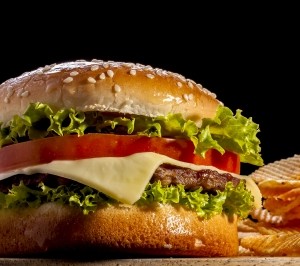McDonaldization of Society

The process by which the principles of the fast food restaurant are coming to dominate more and more sectors of American society as well as the rest of the world. (Image courtesy of joephotostudio/FreeDigitalPhotos.net)
McDonaldization is a term used by sociologist George Ritzer in his book The McDonaldization of Society (1995). He describes it as the process by which a society takes on the characteristics of a fast foot restaurant. McDonaldization is a reconceptualization or rationalization or moving from traditional to rational modes of thought. Max Weber used the model of the bureaucracy to represent the direction of this changing society, Ritzer sees the fast-food restaurant as having become a more representative contemporary paradigm highlighted four primary components of McDonaldization:
Four elements of McDonaldization
1. Efficiency: the search for the optimum means to a given end this is maintained through organizational rules and regulations. Includes streamlining processes, simplifying goods and services.
•2. Calculability: is an emphasis on quantifying and measuring often with the claim that time is saved. The emphasis on is number and measurement. Food is bought by the size of portion, ‘Big Mac’ or ‘large fries’, not by taste or quality.
•Ratings for popularity and quantifiable measures for achievement matter more than quality. Television programs are ‘rated’ by the number of people who watch them and less popular programs are cancelled.
•Much of what we get is illusion however, the size of the burger is exaggerated by the fluffy bun and garnishes which are sized to look more generous than they are.
•The quality of everything is compromised by the need to quantify and measure.
Ex… “1 billion served slogan on McDonalds sign
3. Predictability: The food is the same and the service scripted so people take satisfaction from familiarity. People are reassured by predictability. It reduces anxiety if someone knows what to expect and what price they will pay in advance of the transaction.
•Interactions between customers and employees are scripted by many companies; even jokes are added so that no conversation is natural.
•Disney has a very strict dress code for employees, even to the cosmetics and deodorants that they may or may not use.
•There is a loss to the variety and regionalism of life. A shopping centre in a city will have the same shops and products regardless of climate, country or tradition.
4. Control (of people) through replacement of human with nonhuman technology.There is a high degree of control over customers, they even clean up behind themselves. There is control over the workers who obey the rules. Much control is enforced through technology, even the cash register can be operated by someone who cannot read. For example, last year McDonalds’ outsourced jobs to India from Carson California, drive up orders placed in Carson, call to a person in India.
• Non human technology includes machines, architecture/interior design, it is easier to control people through technology than personal interaction so McDonaldized companies use technology. The less that people have to do from their own initiative, the less that they exercise skill or judgement.
•Control is subtle so we are not aware of it but even the colors of the tables are designed to make people unwilling to stay for too long over eating.
•Food arrives at restaurants ready sliced or frozen. Even fries are timed automatically in the fat so that they are the correct colour. This has led to factory farming so that egg size can be controlled!
Teenagers are employed because they will give way to rules more than adults
With these four processes, a strategy which is rational within a narrow scope can lead to outcomes that are harmful or irrational.
Social Illusions
•McDonald’s promotes itself as a ‘family’ eating place, but in reality, such companies are destructive of family life. People do not eat together, or linger over food.
•The food is not nutritious or tasty despite advertising; it is just filling, so that it engenders health problems for people who may become obese.
•Many companies insist that employees smile constantly. They tell employees to say ‘Have a nice day!’ but this phrase actually means ‘Go away, I need to move on to the next inquiry.’
•Life is dehumanized and people feel alienated because there is no real sense of social or emotional contact despite the fact that we are buying into a set of promotional values which suggest the opposite is taking place.
New Frontiers
McDonaldization has crept into all spheres of life:
•New born babies are measured for health and given scores on certain tests rather than cuddled.
•People usually would choose to die at home with their families, but medical death is usually among strangers whilst hooked up to machines measuring breathing and pulse rates.
•There are mass-market corporations who organize funerals and services in crematoria are limited to 15 minutes only.
•Even adventure holidays on Everest follow set routines and organizational plans to make the experience safe and enjoyable.
De-McDonaldization?
•In the USA, McDonald’s is facing serious competition from a number of different franchise companies which aim at a better quality fast-food product.
•Many anti-globalisation protesters and environmental groups have taken McDonald’s to be a symbol of much that is bad and so the restaurants are the target of anti-American demonstrations.
•People seem to be able to see that the reality doesn’t fit the picture – there are queues in McDonald’s for instance and people become disillusioned.
•McDonald’s itself may yet disappear, but the process is so much part of our society that McDonaldization will not fade away.
How did McDonaldization start?
There are a number of elements to McDonaldization:
•Mass production has been part of the history of the C19th and C20th. At its worst, the Holocaust was an example of it; large numbers of people were killed efficiently and by technology.
•Taylor developed a series of principles of scientific management designed to make work more efficient. These made certain companies profitable.
•The assembly line principle which exercises control over people who all do repetitive and simple tasks.
•Large shopping centers, (shopping malls) where people gather in large numbers are also an element of McDonaldization.
•Although modern shopping systems are seen as efficient, this is because much of the work is passed on to the consumer.
•In fast-food restaurants, they stand in line, place an order, take food to the table, eat with their fingers, dispose of the waste and stack the trays.
•The saving is on employee labor – no waiters, dish washers, table clearing or mess. The work is done by the consumer.
•Petrol stations used to have attendants whose role it was to help the customers, but we do the work ourselves now. The process is extending out into all forms of service work.
•The organizations achieve efficiency but at the cost of workers who have no jobs and customers who must do the work.
All this emphasis on quantity suggests that fast-food restaurants have little interest in communicating anything directly about quality … the fact is that typical McDonald’s customers know they are not getting the highest quality food
Rationalization refers to choosing the most efficient means to accomplish tasks. The traditional ways of doing things which may be inefficient by personal satisfactions and a sense of belonging are passing. Globalization has led to the dominance of the bottom line, to calculation costs in order to produce the most gain, in the place of traditional ways we have bureaucracies while cold analyses are applied to every act of workers with little concern for the people who make up the working staff. Profit has become king, while people, evaluated according to what they bring to the bottom line become expendable.
About admin
Teaching Sociology is very enjoyable for me. Sociology is like a gateway to a plethora of knowledge and understanding. The subject material is directly applicable to real-world events and situations found in everyday life. The methods and concepts of sociology yield powerful insights into the social processes shaping the contemporary world. The ability to identify and understand these processes is valuable preparation for professional participation in an ever changing and complex society.Related Posts
Latest News
-
Sociology and the Pursuit of Social Justice: A Compelling Reason to Study It
Sociology is a fascinating field of study that delves into...
- Posted May 31, 2023
- 0
-
The Power of Sociology: Understanding the Importance of Social Structures
Sociology is the scientific study of society, social relationships, and...
- Posted May 31, 2023
- 0
-
FACT FINDING MISSIONS
Life is interleaved with contracts and agreements, the formal and...
- Posted August 10, 2018
- 0
-
The Many Churches of Enhancement
Throughout history religions formed around prophetic doctrines and absorbed people...
- Posted April 6, 2018
- 0
-
TAKE A SECOND TO CONSIDER THE SECOND
Remember that during the late 1700’s when the young US...
- Posted February 21, 2018
- 0
-
WHAT’S ON THE TABLE FOR IMMIGRATION
Deliberating in upcoming months will be a new proposal for...
- Posted February 12, 2018
- 0
-
Time-saving Tips from Your Instructor
Here are some helpful tips: Involve your family/friends. Let them...
- Posted October 19, 2016
- 0
-
Sociology and the Pursuit of Social Justice: A Compelling Reason to Study It
Sociology is a fascinating field of study that delves...
- May 31, 2023
- 0
-
The Power of Sociology: Understanding the Importance of Social Structures
Sociology is the scientific study of society, social relationships,...
- May 31, 2023
- 0
-
FACT FINDING MISSIONS
Life is interleaved with contracts and agreements, the formal...
- August 10, 2018
- 0
-
Successful Families
SUCCESSFUL FAMILIES Balancing Work and Family (dual-earner families) 1.Value...
- June 16, 2011
- 0
-
Sociology of Marriage
Types of “Good” Marriages: Romantic Marriage: passion and sex...
- June 16, 2011
- 0
Sociological Theory
-
Symbolic Interactionism
Symbolic interactionism focuses on how individuals communicate with one another, the basis...








